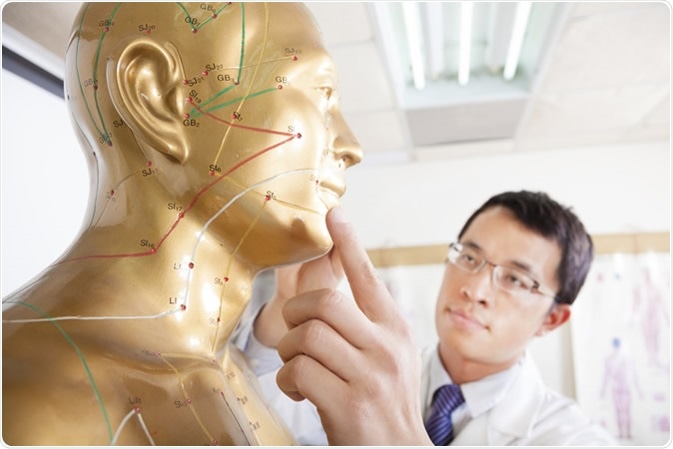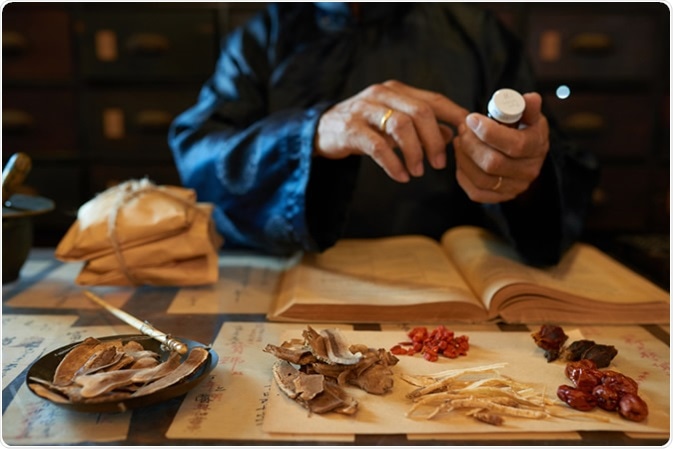Traditional Chinese medicine (TCM) encompasses a variety of herbal medicines and mind-body practices, such as acupuncture. While popular in China and in many other countries as a primary or complementary health approach, its efficacy has not been investigated. However, existing research does suggest that many herbal remedies are effective to treat conditions such as constipation and fever.

Chinese medicine doctor teaching Acupoint on human model. Image Credit: Tom Wang / Shutterstock
How is traditional Chinese medicine used?
TCM is estimated to be around 2,500 years old. In a 2018 milestone, the World Health Organization formally recognized traditional Chinese medicine in its global medical compendium. TCM was estimated to serve around 1 million patients in the USA in 1997, and it is estimated that this figure has increased since then both in the US and in other Western countries. In addition to this, herbal products are often sold as dietary supplements rather than prescription drugs.
Dietary supplements are held to less rigorous standards than prescription drugs, which could account for the relative lack of research on TCM efficacy. In China, TCM use is often standard due to the low toxicity associated with it.
TCM includes a wide range of health interventions, and is also a way of thinking about health and the body. Ancient TCM beliefs include the concept of the body being a smaller version of the universe, of the harmony between yin and yang, that all phenomena can be represented by the five elements, and that the vital energy called Qi flows through the body and maintains health. Scientific research on TCM generally does not concern these aspects of TCM, but rather focuses on the efficacy or possible danger of the medical practices involved.

Practitioner making traditional Chinese remedy. Image Credit: Dragon Images / Shutterstock
TCM approaches and their efficacy
The herbal medicine prescribed to patients in TCM often varies even when the same condition is being treated, which makes direct comparisons of efficacy difficult. However, meta-analyses of studies comparing the efficacy of TCM and Western medicine approaches such as IVF in the treatment of infertility have found that TCM was twice as effective.
Chinese herbal medicine treatment continued for more than 4 months led to clinical pregnancy rates of 60%, compared to 30% when using IVF for 12 months. The difference appears to tie to TCM’s use of the menstrual cycle quality as a diagnostic tool. Furthermore, TCM is often less invasive than western medicine approaches, which can be important when considering conditions such as infertility.
One of the patented Chinese traditional medicines is an antipyretic oral liquid, which is used in children for its antipyretic effects. A study comparing this oral liquid with a common non-steroidal anti-inflammatory drug (NSAID) used in children found that the two medicines had similar effects on reducing an induced fever in rats. Jinxin is composed of a mix of herbal and mineral ingredients, as opposed to Ibuprofen’s active ingredient.
TCM has often been employed as a complementary treatment with other medical procedures. For example, while most patients who have access to it use surgery or chemotherapy to treat cancer, many also complement this with TCM. A certain herbal medicine that has traditionally been used in TCM to treat thirst and general weakness has recently been prescribed to deal with the fatigue associated with radiotherapy and chemotherapy. A randomized, double blind, placebo-controlled study found that the use of this medicine was effective in reducing fatigue associated with cancer treatment.
However, criticisms of TCM are not uncommon. Studies have found that ingredients in herbal remedies are sometimes mislabeled and can contain extracts from endangered animals or toxic plants in place of the advertised ingredients. Given the extent of use of TCM and the reach of such trade, these undesirable ingredients can reach a wide number of patients and could have profound effects on the ecosystems from which they are taken.
Another strong criticism is related to the difficulty of testing the efficacy of TCM. TCM is personalized to each individual and is therefore seldom the same between any two people, whereas doctors and scientists trained in Western countries tend to prefer evidence gained from randomized clinical trials that generalize guidelines for treating patients with the same condition alike.
This criticism has to do more with the underlying belief that one size fits all when it comes to the causation and treatment of disease. It remains to be established whether this hypothesis is valid when it comes to human beings who show incredible variation in their genetics, environmental conditions and lifestyle choices. Instead of an either-or approach, scientists might consider evolving alternative methods to test the efficacy of TCM before promoting or condemning its use.
Further Reading
Last Updated: Apr 29, 2019